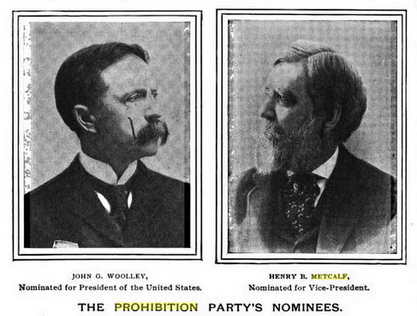Friday, June 7, 2019
Henry Brewer Metcalf
Henry Brewer Metcalf, April 2, 1829 (Boston, Mass.) – October 5, 1904 (Pawtucket, RI)
VP candidate for Prohibition Party (1900)
Running mate with nominee: John G. Woolley (1850-1922)
Popular vote: 210,864 (1.51%)
Electoral vote: 0/447
The campaign:
The 1896 split between the "Narrow-gaugers" and the "Broad-gaugers" was healed by 1900 and the Prohibition Party was one again-- with the "Narrow-gaugers" in control. They nominated recovering alcoholic John Woolley (who used his own rehabilitation as an example during his lectures) and Henry B. Metcalf, a long-time prohibition advocate now in his early 70s who was probably one of the last candidates in any party who had formerly been a Whig. They campaigned together on a train called "The Prohibition Special" clocking in the miles and making hundreds of speeches.
The B. in Henry B. Metcalf stood for "Brewer," which could be a rather unfortunate name for a Prohibitionist.
Their platform was basically a single-issue document. If they veered into other political topics the Party was able to tie it to their main issue. For example, here is a statement from the platform about American imperialism, which was becoming an accepted and open concept by the McKinley administration at the time:
"Fourth—We deplore the fact that an Administration of this Republic claiming the right and power to carry our flag across seas, and to conquer and annex new territory, should admit its lack of power to prohibit the American saloon on subjugated soil, or should openly confess itself subject to liquor sovereignty under that flag. We are humiliated, exasperated and grieved, by the evidence painfully abundant, that this Administration's policy of expansion is bearing so rapidly its first fruits of drunkenness, insanity, and crime under the hot-house sun of the tropics; and when the president of the first Philippine commission said:`It was unfortunate that we introduced and established the saloon there, to corrupt the natives and to exhibit the vices of our race,' we charge the inhumanity and unchristianity of this act upon the Administration of William McKinley and upon the party which elected and would perpetuate the same."
The Prohibition Party placed third on Election Day. It was their 5th best national result in their long history. On the ballot in all but five states, they had their strongest percentage in Florida with 5.66%.
Election history:
1874-1875 - Pawtucket, Rhode Island City Council
1885 - Rhode Island Senate (Republican)
1886 - Rhode Island Senate (Republican) - defeated
1893 - Governor of Rhode Island (Prohibition) - defeated
1894 - Governor of Rhode Island (Prohibition) - defeated
1896 - US House of Representatives (RI) (Prohibition) - defeated
1900 - Governor of Rhode Island (Prohibition) - defeated
1904 - Governor of Rhode Island (Prohibition) - died before the election
Other occupations: businessman, trustee of Tufts College, banker, officer in the American Anti-Imperialist League
Buried: Mount Auburn Cemetery (Cambridge, Mass.)
Notes:
If elected he would have died in office about six months before his term was over.
Graduate of Tufts College 1856
Was a Whig up to 1860, then a Republican, then a Liberal Republican in 1872, then a Republican
again until 1888 when he helped create the Law Enforcement Party, then the Union Party in 1889,
then the Prohibition Party the same year.
Universalist.
In the same cemetery as fellow 3rd party VP candidates Henry Lee (1782-1867 Nullifier Party 1832),
Edward Everett (1794-1865 Constitutional Union Party 1860), and Charles Horatio Matchett
(1843-1919 Socialist Labor Party 1892)
Moved to Rhode Island as a result of being a victim of the Great Boston Fire of 1872







